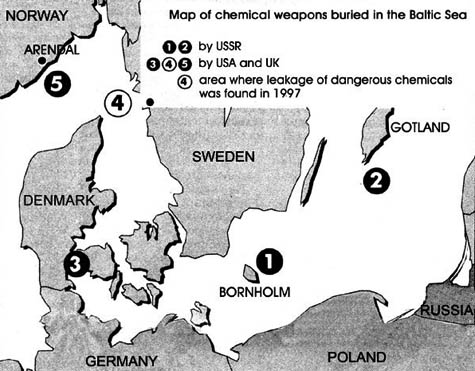This article will be update in the future
The main streets of Kaliningrad
http://www.youtube.com/watch?v=pl2kjMinyxY
DW-TV Kaliningrad-Tax haven for investors.
Not yet though for foreign investors, as money simply disappear in black hole of Kremlin. Do not trust and do not deal with Kremlin people and your money will be safe. Deal with Kaliningraders who is willing to unite back Konigsberg and EU.
http://www.youtube.com/watch?v=8d1kPMIMZ-c&feature=related
Kaliningrad fights Baltic amber smuggling.
Kremlin corruption at it`s worst.
http://www.youtube.com/watch?v=P4EhgSskjUw&feature=related
Saturday, January 24, 2009
Saturday, January 17, 2009
Is our Baltic sea for peace or for war stupidity?

More than 300,000 tons of weapons were dumped by the Allies between 1945 and 1947. The toxic stockpile includes nearly 65,000 tons(net!) of mustard gas, nerve agent sarin and the notorious death camp gas, Zyklon B.
Environmental aspects and the issue of protection of the sea were completely ignored at that time.
1. The Bornholm site is located in the western Baltic, east of the island of Bornholm. Over 35.000 tons were dumped in water depths ranging between 70 and 120 m. The CW contained an estimated 13.000 tons of toxic agents. Most CW was thrown over board packed in crates or containers, but some ships were also sunk.
2. The Gotland Deep site is located in the central Baltic. At least 2.000 tons of CW was dumped here (some sources mention a total of 40.000 tons). There are strong indications that part of the conventional and chemical munition was thrown overboard during transport to the Baltic dump sites; how many tons were thus dumped is not known. Most likely it is mainly this ammunition that has been washing ashore on the beaches of Denmark and Poland.
3. The Måseskär site is located in the eastern Skagerrak, 25 km off the Swedish coast. At least 8 ships were sunk here in a water depths ranging between 180-200 m. According to reports roughly 30.000 tons of toxic agents were dumped.
Some degradation products of chemical warfare agents are even more persistent and several times more toxic than their original substance (e.g. mustard gas and lewisite).

It is important to note that, in addition to the dumping of tens of thousands of tons of chemical munitions into the Baltic sea, many more tens of thousands of tons of conventional explosives were also disposed of in this manner, sometimes in the same shipments or locatit is clear that the munitions are subject to corrosion effects rendering them fragile or even resulting in leakage of CW agents. There is also good evidence that certain types of explosive can become extremely unstable with the passage of time.

Public concern over the potential environmental impacts inherent in sea-dumped CW is genuine. Too often opinion of people populated Baltic shores have been ignored in order to provide support for unrelated strategic or economic considerations.
Saturday, January 3, 2009
Kaliningraders vs. Kremlin State.

( On photo, Polish politics trying to help somehow to Kaliningraders)
The government's decision to raise import duties on used foreign cars and trucks, aimed at protecting domestic and foreign car producers in Russia amid the global credit crunch will come into force on January 12.
In reality, the duty on used cars will double, and triple for trucks.
The decision has led to an increase in those wishing to bring foreign-made cars into the Kaliningrad Region since early December as people try to avoid the January deadline.
The head of a public organization that protects motorists "Spravedlivost" ( Justice) Konstantin Doroshok said a 33-year-old man had died on the Russian-Lithuanian border crossing Friday morning on December 26 after spending several days waiting to cross the border. Driver Vycheslav Skubna will never come back to home anymore.

(On photo, Polish people helping Kaliningraders by bringing them free food and woods to warm up in freezing cold.)
Protests by motorists unhappy with the slow processing and bribery by customs periodically take place on the border. Customs showing just open sabotage by not processing at all.
In addition, corruption has gotten markedly worse as the level of monopolization in the economy and bureaucratization of government has increased. All of this is pushing people’s discontent to the surface.

(On photo, Polish-Russian border, Branevo-Mamonovo. Long queue for a few kilometers, almost 700 cars.)
The anger over increased import duties is particularly strong among residents of the Kaliningrad region, the majority of which -- perhaps as high as 55 percent -- make a living either directly or indirectly connected with the sale or servicing of imported automobiles.
To some, Visas come to an end, the Russian state compels them to break EU rules by staying in queue in their cars near borders..
Russian newspapers and TV are silent, as the state holds the control over a freedom of speech in Russia.
Eventually on family holidays the Christmas and New Year, the Russian state by customs bodies has thrown and left people in the winter in unhuman conditions on borders.
Subscribe to:
Posts (Atom)